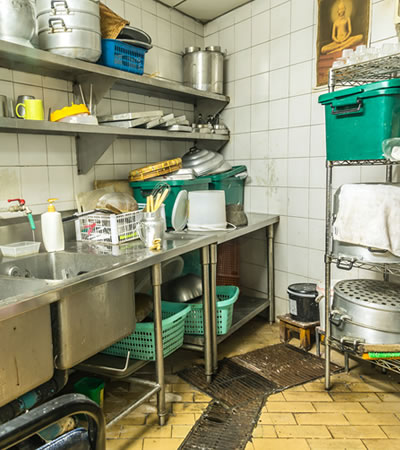It’s no secret that quality restaurant equipment and properly trained staff is essential to a successful foodservice operation. With thousands of dollars invested into kitchen equipment, it is surprising how frequently mistakes can compromise the integrity of the equipment and often a business’s reputation. Is your restaurant’s kitchen making these five frequent mistakes?

1. Bad Kitchen Layout
Investing in top-of-the-line restaurant equipment is important, but it won’t help you much if you don’t have a good kitchen layout. Function and flow are critical elements of commercial kitchen design and must be considered prior to purchasing equipment. For optimum efficiency, each piece must be measured, sized and installed correctly in the best possible place.
This is especially important when designing a kitchen for a new foodservice establishment. Before you start shopping for equipment, we recommend knowing what your expected menu items, production expectations, and line requirements will be. This will help you select the proper equipment to meet demands.
If you are expanding operations or replacing older equipment, consider what bottlenecks your kitchen staff handles on a daily bases and where your growth potential may be. Your staff will really appreciate if you can make their job easier and you will appreciate the time savings!
2. Poor maintenance
Your restaurant equipment works hard day in and day out, and as a result, can break down if not maintained correctly. Proper cleaning and regular maintenance is essential. Too often in commercial settings restaurant managers focus on daily cleaning but ignore recommended maintenance check ups. Keep all manufacturer’s manuals on hand to keep track of standard maintenance tasks and their recommended schedules.
3. Bad electrical connections
Trying to use an electrical connection that does not match the voltage requirements of the equipment it needs to run isn’t a bad idea – it’s completely unsafe. Know the electrical requirements for all of your kitchen equipment and update outlets appropriately. Unless you have experience in electrical installation, it’s best to call a certified electrician to ensure your space is safe and your equipment and employees are protected.
4. Not following code
Sure, you had to get certified before the grand opening. But after opening, many restaurants get lax and let a few too many best practices fall to the wayside. Do not fall into this trap! Whether it’s regulations for equipment, ventilation, food safety or something else, codes exist to keep everyone safe. Furthermore, you risk having your business shut down should the code violation be discovered or reported.
5. Poorly trained staff
One of the biggest hazards to restaurant equipment is an employee who hasn’t been properly trained to use, clean and maintain it. Even savvy chefs may need training on new pieces of equipment, so make sure education is part of the on-boarding process for any new kitchen staff.

